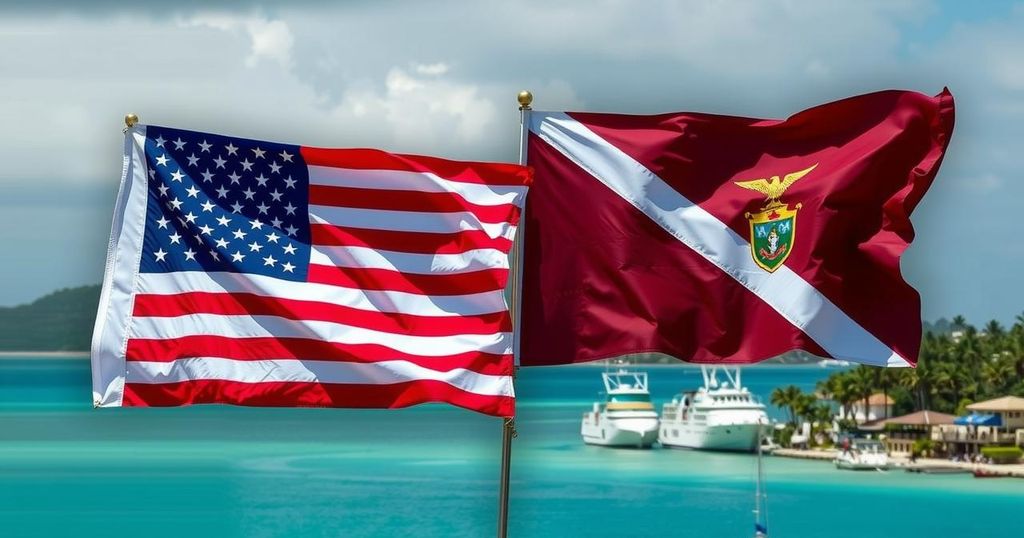Trinidad and Tobago and US Strengthen Military Ties Amid Venezuela Tensions

On December 10, 2024, the United States and Trinidad and Tobago renewed military cooperation agreements, including a revised Status of Forces Agreement (SOFA). The agreements aim to improve military interoperability between the nations. Prime Minister Keith Rowley denied allegations that this would permit US troop deployments in conflicts involving Venezuela, emphasizing Trinidad and Tobago’s commitment to regional peace and sovereignty while managing key energy partnerships with Venezuela.
On December 10, 2024, the United States and Trinidad and Tobago formalized the renewal of several military cooperation agreements, including a revised Status of Forces Agreement (SOFA). This renewed pact is designed to enhance military interoperability between the two nations, as confirmed by officials from the US Department of Defense. Additionally, agreements extending the Caribbean Basin Security Initiative Technical Assistance Field Team (CBSI-TAFT) and the Acquisition and Cross-Servicing Agreement (ACSA) were also established, marking a significant step in defense collaboration.
While US Ambassador Candace Bond lauded these agreements for providing exceptional opportunities for bilateral defense cooperation, they have sparked considerable debate within Trinidad and Tobago. Reports from local media suggested that the amended SOFA enables Washington to request troop deployments amid crises, including a potential conflict in Venezuela, which Prime Minister Keith Rowley quickly refuted. At a press conference, Rowley condemned the media’s interpretation, asserting that Trinidad and Tobago would not become a military base for foreign troops. He emphasized the nation’s commitment to regional peace and underscored the country’s historical efforts in mediating conflicts involving Venezuela.
The controversy arises in the context of Trinidad and Tobago’s recent natural gas exploration collaboration with Venezuela, where they are engaging multinational companies in joint ventures. Prime Minister Rowley clarified that the renewal of the SOFA and the cooperative agreements do not imply military involvement in Venezuela’s internal affairs. He maintained that Trinidad and Tobago values its diplomatic relations with both the US and Venezuela, aiming to balance its commitments without sacrificing its sovereignty.
The renewed military agreements between the United States and Trinidad and Tobago come at a time of heightened geopolitical tensions in the Caribbean, particularly regarding Venezuela. The SOFA, which governs the presence of US military personnel in Trinidad, has been a subject of scrutiny, with allegations suggesting it would enable troop deployments in case of a conflict. Prime Minister Rowley’s government has attempted to present a united front, emphasizing its dedication to preserving regional peace while managing strategic relationships with both the US and neighboring Venezuela, especially amidst ongoing energy negotiations. The backdrop to this renewal includes the historical context of Trinidad and Tobago’s diplomatic stance, which favors mediation in Venezuelan conflicts, while simultaneously navigating pressures from the US amidst their sanctions against Venezuela. Recent developments in offshore gas exploration further complicate the landscape, as Trinidad seeks to benefit from resources without antagonizing Caracas.
The renewal of military cooperation agreements between the United States and Trinidad and Tobago reflects a strategic commitment to enhancing defense ties amid regional dynamics involving Venezuela. While local controversy arose regarding potential troop deployments, Prime Minister Rowley’s firm denial underscores Trinidad and Tobago’s intent to remain a neutral mediating power rather than a military launchpad. Balancing these military agreements with ongoing energy collaboration with Venezuela will be crucial for the island nation as it seeks to navigate complex geopolitical waters.
Original Source: venezuelanalysis.com








